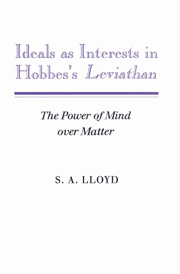Book contents
- Frontmatter
- Contents
- Acknowledgments
- A note on references
- Introduction
- 1 The standard philosophical interpretation
- 2 Hobbes's compositive reconstruction, phase one: identification of the principle of political obligation
- 3 Compositive reconstruction, phase two: religion and the redescription of transcendent interests
- 4 Hobbes's mechanism for the reproduction of social stability
- 5 Hobbes's resolutive analysis, phase two: part 4 of Leviathan
- 6 Theory in practice: Leviathan and Behemoth
- 7 Hobbes's resolutive analysis, phase one: design and detail
- 8 The treatment of transcendent interests
- 9 Hobbes's absolutism
- Notes
- Index
7 - Hobbes's resolutive analysis, phase one: design and detail
Published online by Cambridge University Press: 08 January 2010
- Frontmatter
- Contents
- Acknowledgments
- A note on references
- Introduction
- 1 The standard philosophical interpretation
- 2 Hobbes's compositive reconstruction, phase one: identification of the principle of political obligation
- 3 Compositive reconstruction, phase two: religion and the redescription of transcendent interests
- 4 Hobbes's mechanism for the reproduction of social stability
- 5 Hobbes's resolutive analysis, phase two: part 4 of Leviathan
- 6 Theory in practice: Leviathan and Behemoth
- 7 Hobbes's resolutive analysis, phase one: design and detail
- 8 The treatment of transcendent interests
- 9 Hobbes's absolutism
- Notes
- Index
Summary
Any man that sees what I am doing, may easily perceive what I think.
–Hobbes (L 180)As we've seen, the standard philosophical interpretation assigns a prominent role in Hobbes's political theory to the notions of mechanistic materialism, an egoistic conception of human psychology that is preservation-centered, moral subjectivism or personal relativism, and coercive force; and discounts the importance to the theory of such notions as moral and religious interest and duty. This orthodox understanding of the components of Hobbes's theory is quite naturally suggested by the text of Leviathan, provided that attention is focused primarily on Part 1, and that examined through the lens of our contemporary concerns. Certainly in Part 1 Hobbes issues pronouncements and makes remarks that, considered singly, seem fairly straightforward statements of egoism, moral subjectivism, and the like. But the standard emphasis on these notions is no part of our interpretation of Hobbes's political theory, and the precision criterion for adequate interpretations requires that we provide a plausible alternative to the orthodox understanding of these particular remarks. I propose to do that in this chapter and, in the process, to provide a general account of the function and content of Part 1, thereby rounding out my own interpretation of Leviathan and offering a view of how the book is structured.
The account I present of each set of remarks from which the standard philosophical interpretation compiles one of the orthodox categories proceeds from the idea that the best way to discover what Hobbes thinks – what he means by his remarks – is to analyze what he is doing – how, and toward what end, he is using those remarks.
- Type
- Chapter
- Information
- Ideals as Interests in Hobbes's LeviathanThe Power of Mind over Matter, pp. 234 - 270Publisher: Cambridge University PressPrint publication year: 1992



